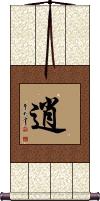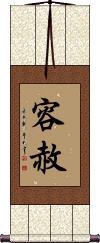Many custom options...
And formats...

Easy-Going in Chinese / Japanese...
Buy an Easy-Going calligraphy wall scroll here!
Personalize your custom “Easy-Going” project by clicking the button next to your favorite “Easy-Going” title below...
Easy-Going
逍 is a Chinese word that means leisurely or easy-going.
In some contexts, it can mean roaming or sauntering.
This can be pronounced as "shou" in Japanese but rarely seen as a single Kanji in Japan. This is better if your target audience is Chinese.
Forgiveness (from the top down)
容赦 is the kind of forgiveness that a king might give to his subjects for crimes or wrong-doings.
容赦 is a rather high-level forgiveness. Meaning that it goes from a higher level to a lower (not the reverse).
Alone, the first character can mean “to bear,” “to allow,” and/or “to tolerate,” and the second can mean “to forgive,” “to pardon,” and/or “to excuse.”
When you put both characters together, you get forgiveness, pardon, mercy, leniency, or going easy (on someone).
See Also: Benevolence
This in-stock artwork might be what you are looking for, and ships right away...
Gallery Price: $60.00
Your Price: $36.88
Not the results for Easy-Going that you were looking for?
Below are some entries from our dictionary that may match your Easy-Going search...
| Characters If shown, 2nd row is Simp. Chinese |
Pronunciation Romanization |
Simple Dictionary Definition |
娑 see styles |
suō suo1 so sha |
(phonetic); see 婆娑[po2 suo1] To play, careless, idle, easy going; translit. s, ś, chiefly sa, sā. |
甘い see styles |
amai あまい |
(adjective) (1) sweet-tasting; sweet; sugary; sugared; (adjective) (2) fragrant (smelling); sweet (music); (adjective) (3) lightly salted; light in salt; not spicy; (adjective) (4) (See 甘く見る) naive; overly optimistic; soft on; generous; indulgent; easy-going; lenient; (adjective) (5) half-hearted; not finished properly; (adjective) (6) insufficient; not satisfactory; inadequate; loose; (adjective) (7) mild; (adjective) (8) (See 甘い言葉) tempting; enticing; luring |
楽ちん see styles |
rakuchin; rakuchin らくちん; ラクチン |
(adjectival noun) (1) pleasant; (2) easy-going; easy life |
楽天家 see styles |
rakutenka らくてんか |
optimist; easy-going person |
無造作 see styles |
muzousa / muzosa むぞうさ |
(adjectival noun) (1) casual; off-hand; careless; easy-going; (2) artless; simple |
無雑作 see styles |
muzousa / muzosa むぞうさ |
(adjectival noun) (1) casual; off-hand; careless; easy-going; (2) artless; simple |
さばさば see styles |
sabasaba さばさば |
(adv,adv-to,vs) (1) (onomatopoeic or mimetic word) relieved; refreshed; (adv,adv-to,vs) (2) (onomatopoeic or mimetic word) frank; candid; easy-going; laid-back |
ラクチン see styles |
raguchin ラグチン |
(adjectival noun) (1) pleasant; (2) easy-going; easy life; (personal name) Lagutin |
Variations: |
nonkimono のんきもの |
happy-go-lucky person; easy-going person; optimist |
イージーゴーイング see styles |
iijiigooingu / ijigooingu イージーゴーイング |
easy-going |
Variations: |
sabasaba; sabasaba サバサバ; さばさば |
(adv,adv-to,vs) (1) (onomatopoeic or mimetic word) relieved; refreshed; (adv,adv-to,vs) (2) (onomatopoeic or mimetic word) frank; candid; easy-going; laid-back |
Variations: |
muzousa / muzosa むぞうさ |
(noun or adjectival noun) (1) easy; simple; ready; (noun or adjectival noun) (2) casual; off-hand; easy-going; careless; artless |
Variations: |
muzousa / muzosa むぞうさ |
(noun or adjectival noun) (1) easy; simple; ready; (noun or adjectival noun) (2) casual; off-hand; easy-going; careless; artless |
The following table may be helpful for those studying Chinese or Japanese...
| Title | Characters | Romaji (Romanized Japanese) | Various forms of Romanized Chinese | |
| Easy-Going | 逍 | shou / sho | xiāo / xiao1 / xiao | hsiao |
| Forgiveness (from the top down) | 容赦 | you sha / yousha / yo sha | róng shè / rong2 she4 / rong she / rongshe | jung she / jungshe |
Successful Chinese Character and Japanese Kanji calligraphy searches within the last few hours...






